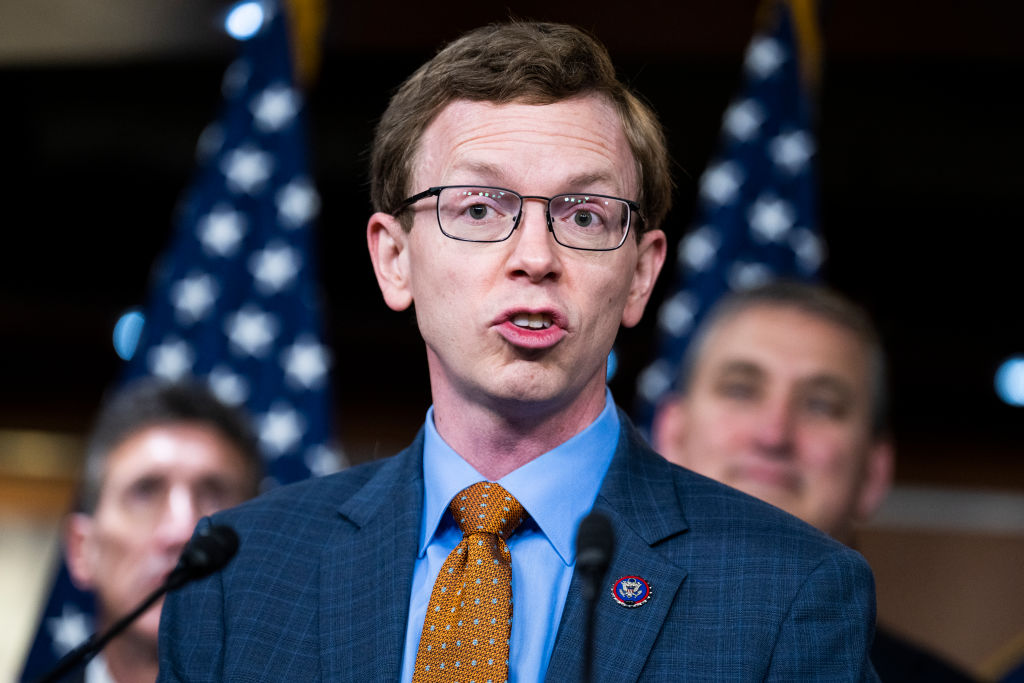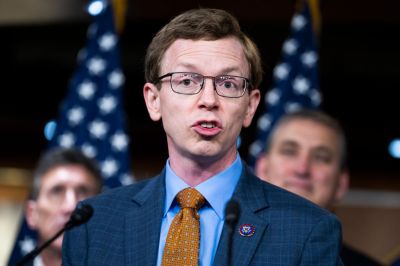Republican pragmatists in the House of Representatives have a message for President Joe Biden: We don’t support a clean debt ceiling increase, either.
Rep. Dusty Johnson says that the group of pragmatic conservatives he leads in the House would oppose legislation raising the federal borrowing limit absent an accompanying deal with Biden and Senate Democrats to rein in government spending and reduce Washington’s $31.4 trillion debt. Absent such an agreement, the United States risks defaulting on its financial obligations, conceded Johnson, chairman of the Main Street Caucus, which now numbers more than 70*.
“I don’t know a single pragmatic conservative who supports a clean debt ceiling increase,” the South Dakota Republican told The Dispatch in an interview Thursday. “If President Biden decides he wants to be a legislative terrorist who refuses to have a discussion about—who refuses to discuss meaningful action on a $32 trillion debt, then he has the power to hurt America. There’s no question about that.”
Inside the Beltway, the “Will they or won’t they?” chatter about Republicans and a debt ceiling increase typically revolves around the House Freedom Caucus. This group of roughly 45 conservative insurgents tends to demand steep spending cuts and debt reduction measures in exchange for their votes to hike the federal borrowing limit. (At least, that’s been the case under Democratic presidents; it wasn’t under former President Donald Trump.)
But with Johnson’s comments, now the Main Street Caucus seems to be drawing a hard line too as House Speaker Kevin McCarthy prods Biden*. That’s significant—this is the Republican caucus in the House that prefers governing over brinksmanship and is not particularly aligned with Trump. “We don’t like fiscal cliffs,” Johnson said. “We don’t like dumpster fires.”
Those comments suggest members of Johnson’s caucus are open to compromising with the White House and congressional Democrats—eventually—if that’s what it takes to avoid a debt default.
The federal government reached the statutory debt limit late last month, with the Treasury Department informing Congress it had begun taking “extraordinary” measures to avoid default. The administration’s ability to take such steps is expected to end sometime in July, at which time legislation will be required for the U.S. to pay its bills.
But Johnson vows Biden will not succeed in using the threat of economic calamity to split the Main Street caucus from the rest of the House Republican conference. “He’s going to need to come to the table and really negotiate,” said Johnson, 46, a third-term congressman and member of McCarthy’s kitchen cabinet of advisers included in House GOP leadership meetings.
“If [Biden] thinks that the Republicans are going to splinter off and get weaker and just be willing to accept a third of a loaf, that’s not going to happen,” he added. “We’re not going to default on this debt, but we absolutely have to make serious and material changes to how we spend money in this country. And Joe Biden's got to accept that. And I think if he does, he's going to have the Republican Conference in a united way being willing to cut a deal.”
An acceptable accord is in the eye of the beholder. The Main Street Caucus’ full loaf might look like a “third of a loaf” to the House Freedom Caucus*. What then? Conservative pragmatists aren’t about to be bullied into missing an opportunity to strike what they believe is a good deal with Biden and Democrats who control the Senate. They outnumber their insurgent-minded colleagues and are prepared to use that advantage to exert pressure.
McCarthy and Biden’s Wednesday meeting at the White House to discuss the debt ceiling suggests the president’s stated refusal to negotiate is not a red line (the White House did not respond to a request for comment). Meanwhile, Johnson signaled that House Republicans would show their cards in any talks. In other words, they will reveal which programs and discretionary spending items they believe should be eliminated or pared back. But he said that information was likely to remain guarded until a final deal is reached.
This approach, while politically sensible, has put House Republicans in a bit of a public relations bind.
House Republicans say they are leveraging the debt ceiling and the danger of default because federal finances have reached a crisis after the government ran up trillions on the nation’s credit card under both parties—especially during the coronavirus pandemic.
Yet they are refusing to name any program, or line item, that deserves the knife.
Indeed, the only specifics Johnson would discuss were the spending items Republicans are promising to protect as part of any debt ceiling deal. Medicare and Social Security, he said, are sacrosanct and untouchable. That may be politically sensible—those social safety net programs are popular among seniors, reliable voters every two years. But Medicare and Social Security, which increase automatically each year, are among the biggest drivers of the national debt.
Johnson acknowledges Congress will have to deal with those but not during current talks. “To be clear and explicit, Medicare and Social Security are off the table with regard to this debt ceiling negotiation—Medicare and Social Security benefits.”
Audrey Fahlberg and Haley Byrd Wilt contributed to this report.
Correction, February 6, 2023: An earlier version of this story misidentified the group chaired by Rep. Dusty Johnson. It is the Main Street Caucus.







Please note that we at The Dispatch hold ourselves, our work, and our commenters to a higher standard than other places on the internet. We welcome comments that foster genuine debate or discussion—including comments critical of us or our work—but responses that include ad hominem attacks on fellow Dispatch members or are intended to stoke fear and anger may be moderated.
With your membership, you only have the ability to comment on The Morning Dispatch articles. Consider upgrading to join the conversation everywhere.